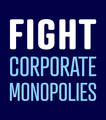FACT CHECK: Chamber of Commerce, A Monopoly Front Group, Pushing Antitrust Falsehoods
The U.S. Chamber of Commerce, a front group controlled by Big Tech, Big Pharma, Big Ag, and Wall Street CEOs, has brazenly declared “war” on antitrust enforcement. In their so-called war, lobbyists for some of the biggest corporations have pushed economic misinformation and outright falsehoods.
Let’s set the record straight.
The Truth: Antitrust lowers prices.
With unprecedented consolidation among a small group of big corporations, antitrust action can significantly drive down prices.
When antitrust enforcers block mega-mergers and push to lower economic concentration, they are taking a stand to lower prices for American families and small businesses:
- Antitrust action fights against price increases of 7% on average when big corporations merge and push out competition.
- Antitrust action fights against increasing price markups, which have risen to 61%, tripling from 21% in the 1980’s due increased consolidation.
Market power might also be playing a role in inflation. Dominant firms are given cover to raise prices in ways that might not be detectable. In addition, a rise in mergers and acquisitions has thinned out supply chains, undermining resiliency and leading to price increases.
Corporate profits reached an all-time high in 2021 as price margins jumped to a record-high 13.7% in the second quarter and corporate CEOs stated higher prices in consolidated markets led to higher profits.
The Truth: Antitrust drives innovation.
By definition, antitrust action prevents dominant firms from leveraging their immense influence and resources to stifle competition and innovation.
When antitrust enforcers block anti-competitive behavior, they promote innovation:
The Truth: FTC is championing transparency and consensus.
Despite the rhetoric from the Chamber of Commerce, FTC Chair Lina Khan has ushered in a new era of democratization and consensus-building.
For the first time in decades, the FTC is holding commission meetings open to the public, which have been flooded by small businesses telling their stories of being crushed by monopoly power and brought Commissioners' debates over major policy decisions into the public eye.
Chair Khan also worked to deliver multiple high-profile unanimous votes on some of the biggest issues in front of the FTC, including:
- Unanimous vote to block a $40 billion semiconductor chip merger.
- Unanimous vote to restore the Right to Repair.
- Unanimous vote to shut down “pharma bro” Martin Shkreli’s illegal drug pricing scheme and return up to $40 million to patients.
